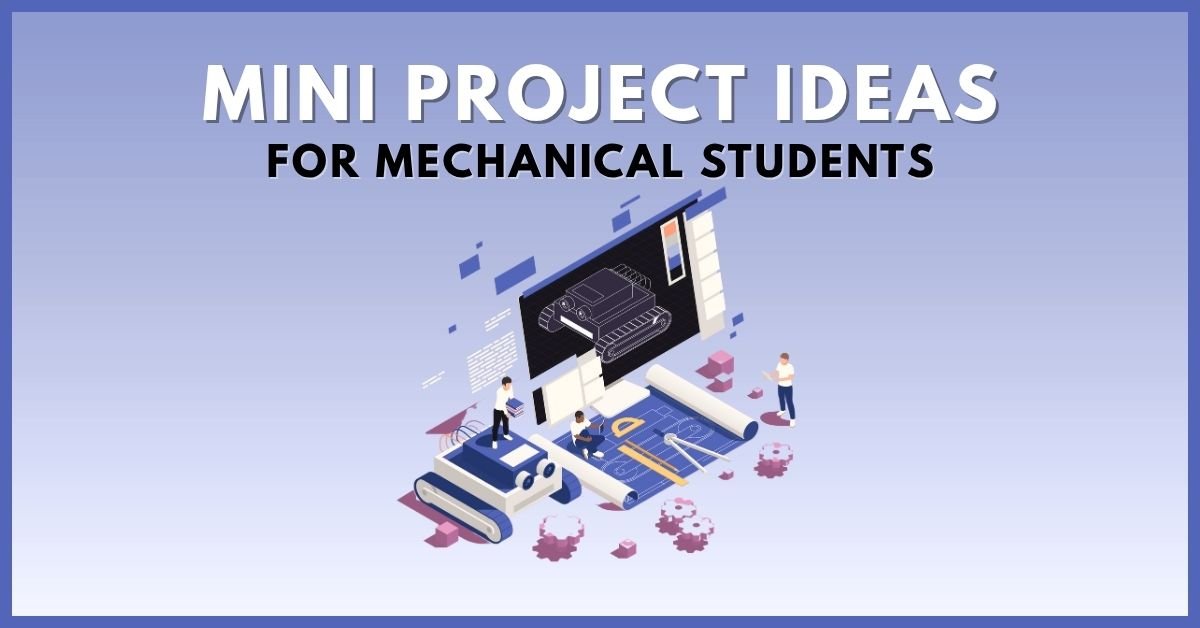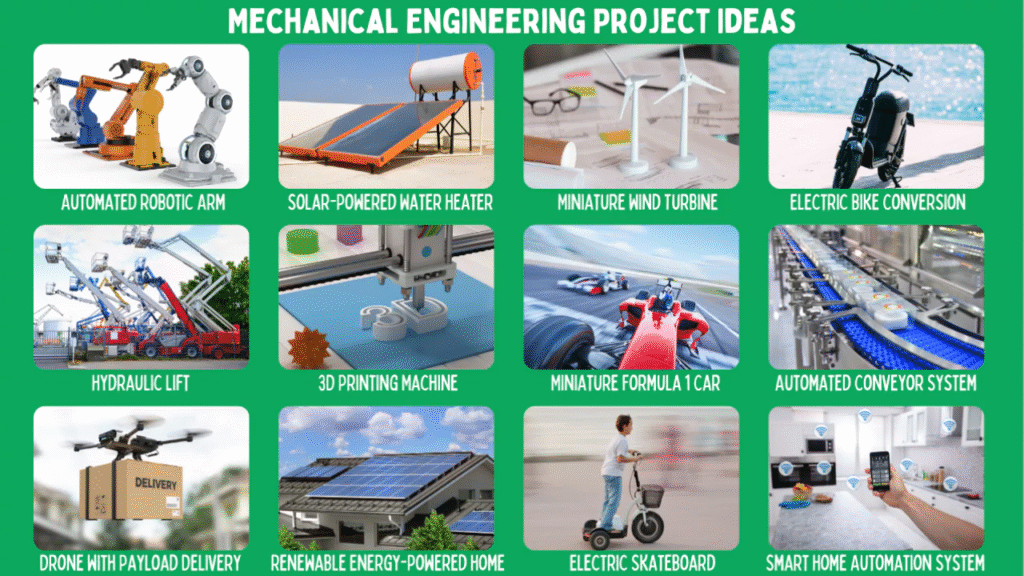Mini Project Ideas for Mechanical Students

Introduction
If you’re a mechanical engineering student, you’ve probably heard the phrase “projects make engineers.” Beyond textbooks and exams, projects help you apply theoretical knowledge to real-world problems. Mini projects are especially important because they are simple, manageable, and ideal for building hands-on experience without needing huge budgets or advanced labs.
In this guide, we’ll explore 50+ mini project ideas for mechanical students across various domains such as automation, robotics, renewable energy, design, thermal systems, hydraulics, and manufacturing. These ideas are beginner-friendly but also impressive enough to showcase during viva, seminars, and placement interviews.
Whether you’re in your 2nd, 3rd, or final year of mechanical engineering, this list will help you pick a project that suits your interests and skills.

Why Mini Projects Are Important for Mechanical Students
Before we jump into the ideas, let’s understand why mini projects matter:
- Practical Application: They bridge the gap between theory and practice.
- Skill Development: You gain hands-on skills in design, fabrication, and testing.
- Resume Value: Projects showcase your technical ability to recruiters.
- Innovation Mindset: They encourage creative problem-solving.
- Interview Confidence: Having a working project helps in placement interviews and viva sessions.
Mini Project Ideas for Mechanical Students
Here’s a categorized list of 50+ project ideas you can choose from:
1. Automation & Robotics Projects
- Automated Pneumatic Vice
- Pick and Place Robotic Arm
- Automatic Bottle Filling System
- Conveyor Belt with Automatic Sorting
- Line Following Robot (Mechanical Design Focus)
- Pneumatic Paper Cutting Machine
- Automatic Car Jack with Gear Mechanism
- Voice-Controlled Wheelchair Design
2. Renewable Energy Projects
- Wind Turbine with Gearbox
- Solar-Powered Water Pump
- Pedal-Powered Generator
- Biogas Plant Model
- Hybrid Wind-Solar Energy System
- Solar-Powered Tricycle
- Magnetic Refrigerator (Conceptual)
- Micro Hydro Power Plant Model
3. Thermal Engineering Projects
- Heat Exchanger Performance Analysis
- Mini Air Cooler using Thermoelectric Effect
- Solar Water Heater with Reflector
- Waste Heat Recovery System
- Portable Cold Storage Box
- Thermal Insulation Testing Chamber
- Stirling Engine Model
- Miniature Steam Power Plant
4. Hydraulics and Pneumatics Projects
- Hydraulic Braking System Demo
- Pneumatic Sheet Bending Machine
- Hydraulic Jack Model
- Hydraulic Lift Design
- Pneumatic Can Crusher
- Hydraulic Bridge Mechanism
- Pneumatic Gear Shifter
- Pneumatic Water Pump
5. Design & Manufacturing Projects
- CAD Model of a Gearbox
- CNC Machine Tool Path Simulation
- 3D Printed Mechanical Components
- Design of a Compact Gear Train
- Portable Drilling Machine
- Automated Screw Jack
- Fabrication of Mini Lathe Machine
- Design of Mechanical Clock

6. Automobile-Based Projects
- Regenerative Braking Model
- Automatic Headlight Dimmer
- Hybrid Vehicle Concept Model
- Go-Kart Chassis Design
- Fuel-Efficient Bicycle Model
- Smart Helmet for Accident Detection
- Self-Balancing Two-Wheeler (Concept)
- Automatic Wiper System
7. Miscellaneous Innovative Projects
- Pedal-Operated Washing Machine
- Footstep Power Generation
- Automatic Umbrella System
- Water-Powered Fan
- Mechanical Seed Sowing Machine
- Automatic Dustbin with Mechanical Lid
- Agriculture Drone (Mechanical Structure)
- Mini Wind Tunnel
How to Choose the Right Mini Project
When selecting a mini project, consider the following:
- Interest & Passion – Pick a domain you enjoy (automobiles, thermal, robotics, etc.).
- Feasibility – Ensure you have the resources, tools, and budget.
- Team Size – Some projects need multiple students, while some can be done solo.
- Learning Outcome – Focus on projects that teach you design, fabrication, and testing.
- Presentation Value – Choose something that looks impressive during viva or seminar.
Tips to Execute a Successful Mini Project
- Start with a simple concept sketch and project report.
- Use readily available materials to reduce cost.
- Divide tasks if working in a group.
- Keep proper documentation (important for viva).
- Prepare a working prototype or demo model.
Conclusion
Mini projects are more than just academic requirements — they are stepping stones toward becoming an innovative mechanical engineer. By working on automation, renewable energy, design, and automobile projects, you’ll gain practical knowledge, confidence, and problem-solving skills.
If you’re serious about standing out in placements or higher studies, choose a project that reflects your passion and creativity. Even a simple model can impress if executed with clarity and innovation.
FAQs About Mini Projects for Mechanical Students
Q1. Which mini project is best for mechanical students?
Projects like solar-powered water heater, automated pneumatic vice, and regenerative braking models are considered best because they are practical, affordable, and impressive.
Q2. How do I choose a mini project topic in mechanical engineering?
Pick based on your interest, feasibility, available resources, and learning outcome. Ensure it is manageable within your semester time.
Q3. Can I do a mini project alone?
Yes. Projects like CAD modeling, solar cooker, or hydraulic jack can be done solo. Larger projects are better in teams.
Q4. What is the difference between a mini project and a major project?
Mini projects are small-scale, short-term projects meant for learning and showcasing concepts. Major projects are larger, require more research, and are often final-year level.
Q5. Do mini projects help in placements?
Yes. Recruiters often ask about projects during interviews. A well-executed mini project highlights your technical skills and problem-solving ability.
Author Profile
- At Learners View, we're passionate about helping learners make informed decisions. Our team dives deep into online course platforms and individual courses to bring you honest, detailed reviews. Whether you're a beginner or a lifelong learner, our insights aim to guide you toward the best educational resources available online.
Latest entries
 UncategorizedOctober 3, 2025AKTU BTech Important Questions & Notes
UncategorizedOctober 3, 2025AKTU BTech Important Questions & Notes Exam Revision NotesSeptember 24, 2025C++ Programming Cheatsheet – STL, OOP Concepts, Syntax
Exam Revision NotesSeptember 24, 2025C++ Programming Cheatsheet – STL, OOP Concepts, Syntax Exam Revision NotesSeptember 22, 2025Java Programming Cheatsheet – Collections, OOP, Exceptions
Exam Revision NotesSeptember 22, 2025Java Programming Cheatsheet – Collections, OOP, Exceptions UncategorizedAugust 28, 2025BTech 1st Year Notes & Cheatsheets (Subject-Wise)
UncategorizedAugust 28, 2025BTech 1st Year Notes & Cheatsheets (Subject-Wise)







